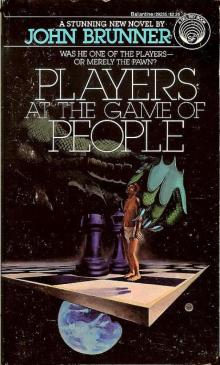Players at the Game of People


Author: John Brunner
Category: Science
Published: 1980
Series:
View: 234
Read OnlineA savagely lacerating satire, this is an example of the sort of literature of ideas sf was before commercial formulae & interminable series took over. A lot of today's readers won't get it & may be pissed off by its unresolved ending. But it's a very good story—though perhaps not quite as good as the socially conscious SF Brunner was producing during his peak a decade previous—& its unapologetic defiance of convention is a breath of fresh air when nearly everything today seems an attempt at a franchise & some authors are happier chugging out Star Wars novels for an easy paycheck than coming up with original sf.
Players at the Game of People is an attack on the leisure class, that fundamentally European institution of bygone days translated into a near-future milieu. Godwin Harpinshield is one of a select number who've entered into this quasi-Faustian arrangement with mysterious beings referred to as "owners." His every desire is catered to. He always gets the best table, the best women. He can travel across the globe & even, apparently, through time in the endless & yet increasingly futile pursuit of pleasure. He has only one obligation: he must recruit someone. This he does by rescuing a pathetic & naturally vulnerable young prostitute from her dead-end lifestyle while she still has a spark of hope & ambition. While it isn't altruistic, this act spells the beginning of the end. Unexpectedly, he meets the girl's mother, who's come looking for her. This encounter not only offers up a surprising personal revelation, it also prompts him to be bold about questioning the nature of the owners & what they're getting out of all this.
Brunner deliberately leaves several aspects of his story unexplained, not the least of which is who the owners are. While this won't make those folks happy who have to have boldface explanations for everything, the novel as it is wouldn't have worked as well without these elements of mystery. By leaving certain key questions up for speculation, he puts you squarely on the same playing field with Harpinshield. A book that could have been terribly obscure is made more accessible, not to mention suspenseful. The cynicism won't appeal to all. There are a few early scenes which come off as uncomfortably racist & sexist by today's standards. But readers who appreciate a dark, satirical edge to their fiction—stories that neither let you off the hook easily nor spell everything out—will find this bitterly ironic yet truthful tale a winner.--T. M. Wagner (edited)
Players at the Game of People is an attack on the leisure class, that fundamentally European institution of bygone days translated into a near-future milieu. Godwin Harpinshield is one of a select number who've entered into this quasi-Faustian arrangement with mysterious beings referred to as "owners." His every desire is catered to. He always gets the best table, the best women. He can travel across the globe & even, apparently, through time in the endless & yet increasingly futile pursuit of pleasure. He has only one obligation: he must recruit someone. This he does by rescuing a pathetic & naturally vulnerable young prostitute from her dead-end lifestyle while she still has a spark of hope & ambition. While it isn't altruistic, this act spells the beginning of the end. Unexpectedly, he meets the girl's mother, who's come looking for her. This encounter not only offers up a surprising personal revelation, it also prompts him to be bold about questioning the nature of the owners & what they're getting out of all this.
Brunner deliberately leaves several aspects of his story unexplained, not the least of which is who the owners are. While this won't make those folks happy who have to have boldface explanations for everything, the novel as it is wouldn't have worked as well without these elements of mystery. By leaving certain key questions up for speculation, he puts you squarely on the same playing field with Harpinshield. A book that could have been terribly obscure is made more accessible, not to mention suspenseful. The cynicism won't appeal to all. There are a few early scenes which come off as uncomfortably racist & sexist by today's standards. But readers who appreciate a dark, satirical edge to their fiction—stories that neither let you off the hook easily nor spell everything out—will find this bitterly ironic yet truthful tale a winner.--T. M. Wagner (edited)
 Fire Burn and Cauldron Bubble, a Paranormal Romance
Fire Burn and Cauldron Bubble, a Paranormal Romance Bad Land
Bad Land The Arm and Flanagan
The Arm and Flanagan The Woman Who Rides Like a Man
The Woman Who Rides Like a Man![[Ravenor 03] Ravenor Rogue - Dan Abnett](https://i1.readfreenovel.com/i/03/16/[ravenor_03]_ravenor_rogue_-_dan_abnett_preview.jpg) [Ravenor 03] Ravenor Rogue - Dan Abnett
[Ravenor 03] Ravenor Rogue - Dan Abnett Dark Tide: Onslaught
Dark Tide: Onslaught To Your Scattered Bodies Go/The Fabulous Riverboat
To Your Scattered Bodies Go/The Fabulous Riverboat Dark Jenny elm-3
Dark Jenny elm-3